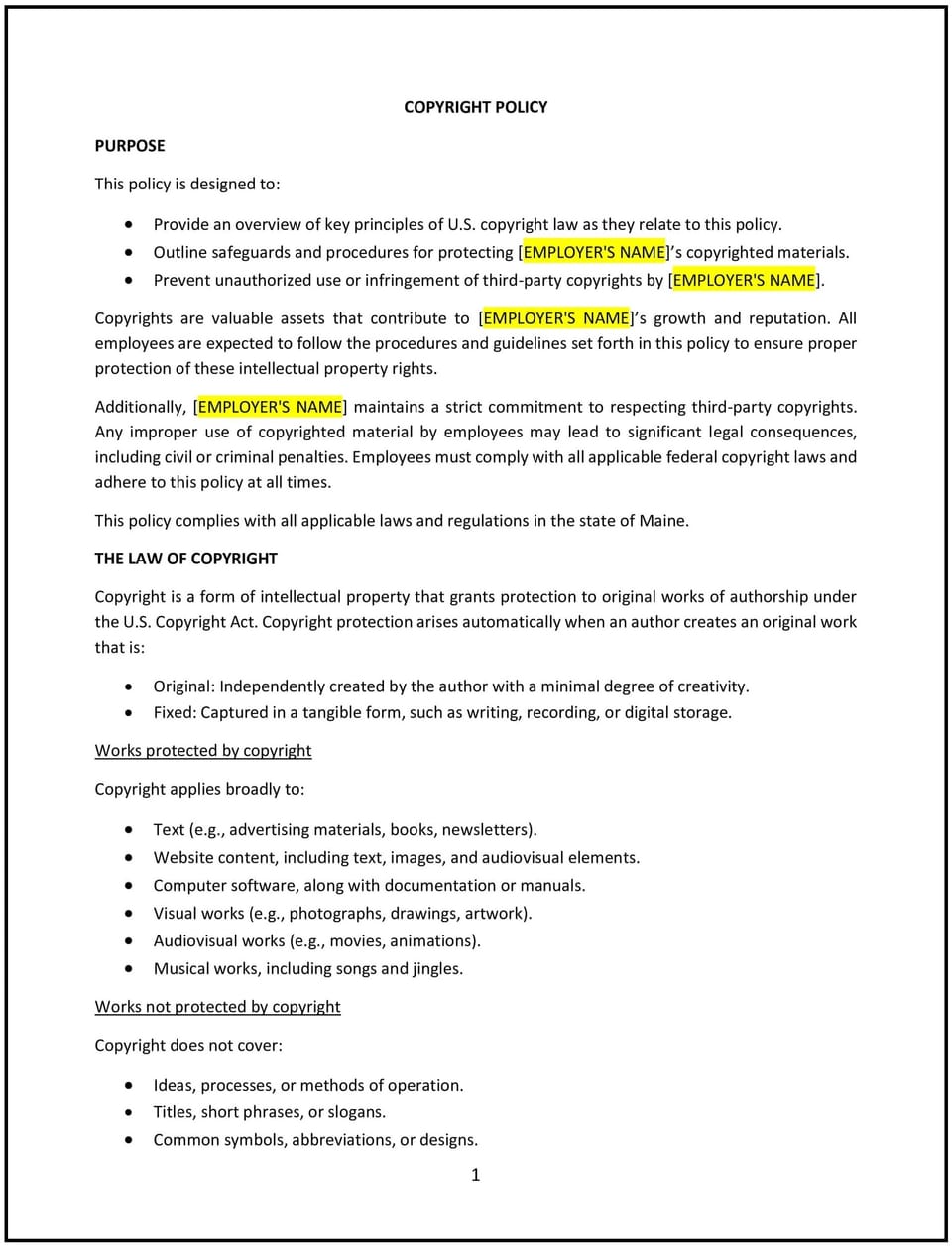Copyright policy (Maine): Free template

Copyright policy (Maine): Free template
This copyright policy is designed to help Maine businesses protect their intellectual property and ensure compliance with copyright laws. It provides clear guidelines for employees on creating, using, and sharing copyrighted materials in the workplace, minimizing the risk of infringement and promoting respect for intellectual property rights.
By implementing this policy, Maine businesses can safeguard their creative works, reduce legal risks, and foster an ethical approach to intellectual property management.
How to use this copyright policy (Maine)
- Define copyright: Clearly explain what constitutes copyrighted material, such as written works, images, software, and multimedia content.
- Outline permissible use: Specify when and how employees may use copyrighted materials, such as through licensing agreements or fair use provisions.
- Clarify ownership: Define who owns the copyright for materials created by employees during the course of their employment.
- Include compliance requirements: Emphasize adherence to Maine and federal copyright laws in all business activities.
- Address infringement: Provide steps employees should follow to report suspected copyright infringement or receive guidance on using third-party content.
- Offer training: Educate employees on recognizing and respecting copyright protections.
- Review regularly: Update the policy to reflect changes in copyright laws or business practices.
Benefits of using this copyright policy (Maine)
Implementing this policy provides several benefits for Maine businesses:
- Protects intellectual property: Safeguards the business’s creative works from unauthorized use or duplication.
- Ensures compliance: Aligns with Maine and federal copyright laws, reducing the risk of infringement claims.
- Promotes ethical practices: Encourages employees to respect intellectual property rights.
- Reduces liability: Minimizes potential legal and financial risks from copyright violations.
- Clarifies ownership: Establishes clear guidelines on intellectual property ownership within the business.
Tips for using this copyright policy (Maine)
- Communicate the policy: Share the policy with employees during onboarding and ensure it is included in the employee handbook.
- Use legal counsel: Consult with intellectual property attorneys to ensure the policy aligns with copyright laws.
- Monitor usage: Regularly review how copyrighted materials are used in the workplace to identify potential issues.
- Provide resources: Make licensing agreements, templates, or tools available to employees for compliant use of third-party materials.
- Address violations promptly: Establish a clear procedure for handling suspected copyright infringements.
- Stay informed: Monitor updates to Maine and federal copyright laws to keep the policy current.
Q: What types of materials are covered under this copyright policy?
A: This policy covers written works, images, videos, software, and other creative content protected under Maine and federal copyright laws.
Q: How can businesses ensure employees comply with copyright laws?
A: Businesses should provide training, make licensing resources available, and monitor the use of copyrighted materials in the workplace.
Q: How often should businesses review their copyright policy?
A: Businesses should review the policy annually or whenever there are changes to Maine or federal copyright laws.
Q: Who owns the copyright for materials created by employees?
A: Businesses should clarify whether the company or the employee owns the copyright for works created during employment, typically through agreements.
Q: What should businesses do if they suspect copyright infringement?
A: Businesses should investigate the issue, consult with legal counsel if needed, and take corrective actions to resolve the situation.
Q: Can employees use third-party materials under this policy?
A: Yes, employees can use third-party materials if they have the appropriate licenses or the use falls under fair use provisions.
Q: How can businesses protect their own copyrighted materials?
A: Businesses should register their works with the U.S. Copyright Office, monitor for unauthorized use, and enforce their rights when necessary.
This article contains general legal information and does not contain legal advice. Cobrief is not a law firm or a substitute for an attorney or law firm. The law is complex and changes often. For legal advice, please ask a lawyer.


